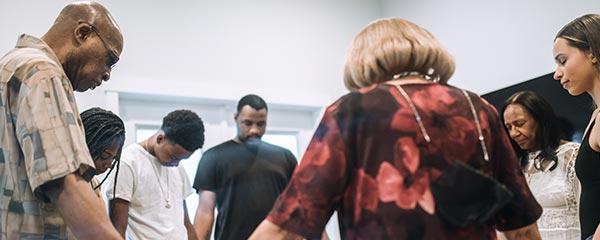WASHINGTON, D.C. -- A tour of the world's most religious countries wouldn't be all mountaintop shrines and magnificent temples -- it would also take you to some pretty bleak places. Gallup Polls in 143 countries reveal that among countries where average annual incomes are $2,000 or less, 92% of residents say religion is an important part of their daily lives. By contrast, among the richest countries surveyed -- those where average annual incomes are $25,000 or more -- that figure drops to 44%.
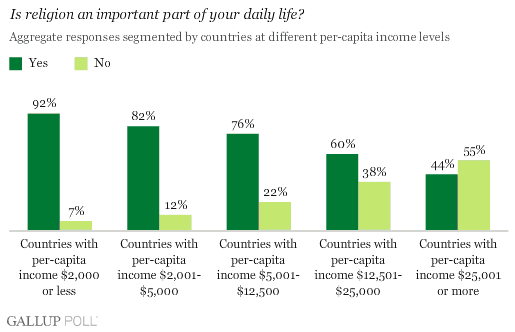
Why is a population's religiosity consistently connected to its wealth, or lack thereof? Sociologists going back to the 19th century have theorized that societies naturally grow more secular as they modernize -- that is, as people begin to grow better off in terms of education and living standards, the importance they attach to religion begins to recede.
But these secularization theories have come under fire more recently for their inability to tell the whole story. Other researchers have shown that religion is in fact a powerful positive force for disadvantaged populations. In 2004, Ronald Inglehart and Pippa Norris used data from the World Values Survey to document a growing "religiosity gap" between developing and industrialized populations. They argued that people in the poorest societies live with much greater vulnerability to forces that threaten their existence, so they're more likely than those in developed nations to rely on religion for hope.
Gallup's 2008 surveys in 32 countries with average annual incomes of $2,000 or less (the countries are listed in the "Survey Methods" section) document the extent to which religiosity appears to affect residents' emotional health. Specifically, they are more likely than those in the less religious group to say they experienced enjoyment the previous day, and they are less likely to have experienced a range of negative emotions.
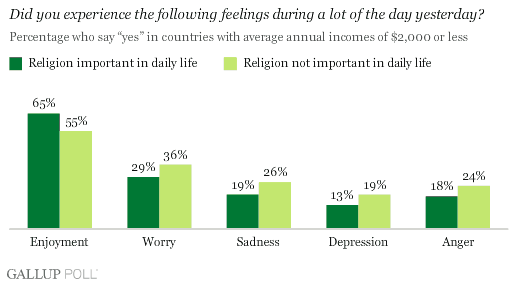
These differences persist even after factoring in other variables that might affect respondents' emotional states such as gender and age. Now compare these results with those from the world's richest countries -- i.e., the 31 countries surveyed in 2008 where residents have average annual incomes of $25,000 or more.
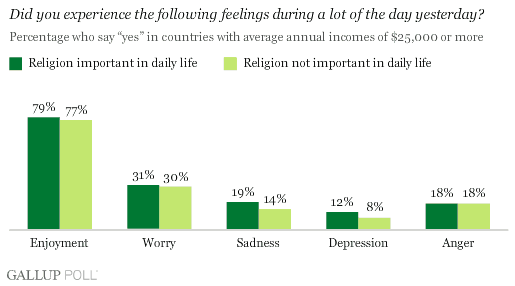
Note that the differences here are smaller -- in fact, in the two cases in which they are more than a couple of percentage points, they are in the opposite direction from those we saw among the poorest countries.
The Social Side of Religion
In rich-world countries, one reason people that are more religious are less likely to get an emotional lift from their faith may be that they have fewer similarly devout people to share that faith with. This gets to another line of thought that emphasizes the social connections that religion fosters in developing societies. Common faith traditions give residents access to social networks and opportunities to forge meaningful relationships that offer emotional satisfaction, as well as a safety net -- a literal form of "social security" -- in times of crisis.
An ongoing analysis by Princeton economists Angus Deaton and Danny Kahneman and Gallup senior consultant Raksha Arora supports this concept, finding that respondents who are more religious give higher ratings on a life evaluation scale in countries where religiosity is more common overall.
In other words, as you move to countries where higher proportions of people say religion is important to them, the relationship between that question and overall life satisfaction gets stronger.
Gallup's data also reveal that in poor countries residents who are more religious are more likely than those who are less religious to say they had positive experiences and interactions the previous day. For example, those in the more religious group are more likely to say they were treated with respect all day and that they smiled and laughed a lot that day. Again, these differences are smaller or nonexistent among rich-world populations.
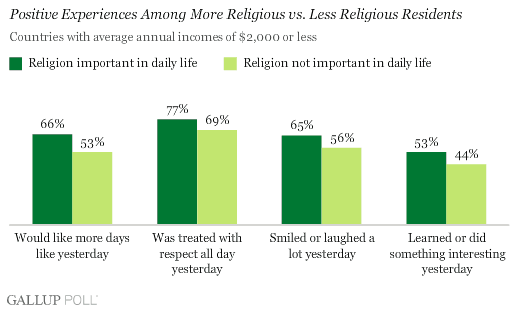
Where Is the "Religion Lift" Strongest?
Finally, let's take a closer look at those poorer countries where 1) there are enough residents who are less religious to meaningfully compare them with their more religious counterparts (7% of the population was our lower limit) and 2) religiosity is most closely associated with more positive emotions and experiences. We can clearly see the effect in most sub-Saharan African countries, but in three countries -- Uganda, Ethiopia, and Burkina Faso -- it is particularly dramatic.
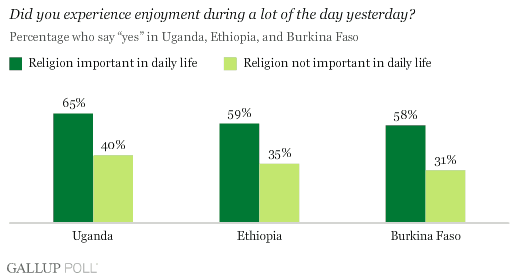
Controlling for the effects of age, gender, and household income, the connection between religiosity and enjoyment is just as strong or stronger.
What do these three countries have in common that might help explain why religiosity appears to have such a powerful effect? Many factors unique to each country may be at play, but it's notable that they share three characteristics:
-
Prominent role of religion in culture. In all three countries, religious traditions are an important part of public life. In Ethiopia, for example, religious festivals are enthusiastically celebrated by entire communities, with members of all faiths participating together.
-
High levels of religious acceptance. None of the three countries has a completely homogenous religious makeup -- all have some mix of Christianity, Islam, and indigenous faiths -- but all three have a history of harmonious coexistence between different faith communities.
-
Low government involvement in religion. The government does not formally align itself with any particular religion in any of the three countries. Nor does the government in any of the three seek to limit or control the religious practices of its people.
It seems likely that these three elements contribute to an environment that maximizes the benefits of religiosity, while minimizing the likelihood of costly religious conflict.
Bottom Line
Gallup Poll results support the idea that the social and psychological benefits of religion are strongest in the world's poorest countries. However, these effects vary from country to country, and as history has shown, religion is often associated with devastating conflict as well. One implication seems to be this: Strategies for development in the world's poorest countries should seek to leverage the positive power of religion by promoting conditions, such as interfaith harmony and low state interference, under which its benefits are most likely to come shining through.
Survey Methods
Global results are based on telephone and face-to-face interviews conducted in 2006, 2007, and 2008 with approximately 1,000 adults in each country. Results from each country have an associated sampling error of ±4 percentage points. In addition to sampling error, question wording and practical difficulties in conducting surveys can introduce error or bias into the findings of public opinion polls.
Countries or areas surveyed with average annual incomes of $2,000 or less include Afghanistan, Bangladesh, Benin, Burkina Faso, Burundi, the Central African Republic, Chad, the Democratic Republic of the Congo, Ethiopia, Ghana, Guinea, Haiti, Kenya, Kosovo, Liberia, Madagascar, Malawi, Mali, Mauritania, Mozambique, Burma (Myanmar), Nepal, Niger, Rwanda, Senegal, Sierra Leone, Tajikistan, Tanzania, Togo, Uganda, Zambia, and Zimbabwe.
Countries and areas surveyed with average annual incomes of $25,000 or more include Australia, Austria, Belgium, Canada, Cyprus, the Czech Republic, Denmark, Finland, France, Germany, Greece, Hong Kong, Ireland, Israel, Italy, Japan, Kuwait, the Netherlands, New Zealand, Norway, Singapore, Slovenia, South Korea, Spain, Sweden, Switzerland, Taiwan, Trinidad and Tobago, the United Arab Emirates, the United Kingdom, and the United States.
